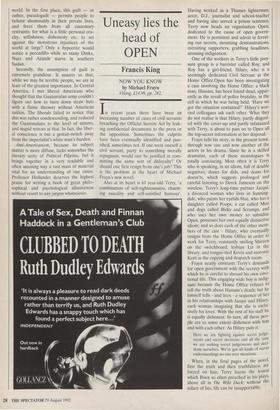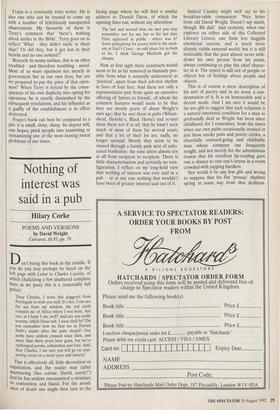Uneasy lies the head of OPEN
Francis King
NOW YOU KNOW by Michael Frayn Viking, f14.99, pp. 282.
In recent years there have been an increasing number of cases of civil servants breaching the Official Secrets Act by leak- ing confidential documents to the press or the opposition. Sometimes the culprits have been eventually identified and pun- ished, sometimes not. If one were oneself a civil servant, party to something morally repugnant, would one be justified in com- mitting the same sort of disloyalty? Or should one first resign from one's job? This is the problem at the heart of Michael Frayn's new novel.
Also at its heart is 61 year-old Terry, 'a combination of self-righteousness, charm- ing rascality and self-satisfied humour'. Having worked as a Thames lighterman, actor, D.J., journalist and school-teacher and having also served a prison sentence, Terry now heads an organisation Open, dedicated to the cause of open govern- ment. He is persistent and adroit in ferret- ing out secrets, mounting demonstrations, recruiting supporters, grabbing headlines, arousing indignation.
One of the workers in Terry's little pres- sure group is a barrister called Roy; and Roy has a girl-friend, Hilary, who is a seemingly dedicated Civil Servant at the Home Office.Open has been investigating a case involving the Home Office: a black man, Hassam, has been found dead, appar- ently as the result of police brutality, in the cell in which he was being held. 'Have we got the situation contained?' Hilary's wor- ried colleagues ask each other. What they do not realise is that Hilary, partly disgust- ed with the cover-up and partly infatuated with Terry, is about to pass on to Open all the top-secret information at her disposal.
Frayn tells his story, in the present tense, through now one and now another of the actors in his drama. Since he is a skilled dramatist, each of these monologues is totally convincing. Most often it is Terry who is speaking, in an idiom, full of double negatives, dones for dids, and donts for doesn'ts, which suggests prolonged and careful listening to Derek Jameson on the wireless. Terry's long-time partner Jacqui, a divorced woman who lives in Sunning- dale, who paints her eyelids blue, who has a daughter called Poops, a cat called Moo and dogs called Bicky and Scrumps, and who uses her own money to subsidise Open, possesses her own equally distinctive idiom; and so does each of the other mem- bers of the cast - Hilary, who eventually resigns from the Home Office in order to work for Terry, constantly smiling Shireen on the switchboard, lesbian Liz in the library, and tongue-tied Kevin and moronic Kent in the copying and despatch room.
Frayn neatly contrasts Terry's demands for open government with the secrecy with which he is careful to shroud his own emo- tional life. This engaging wide boy is indig- nant because the Home Office refuses to tell the truth about Hassam's death; but he himself tells - and lives - a sequence of lies in his relationships with Jacqui and Hilary, each woman imagining that she is exclu- sively his lover. With the rest of his staff he is equally dishonest. In turn, all these peo- ple are to some extent dishonest with him and with each other. As Hilary puts it:
Here we are fighting against secret judge- ments and secret decisions and all the time we are making secret judgements and deci- sions ourselves. We've got all kinds of secret understandings no one ever mentions.
When, in the final pages of the novel, first the truth and then truthfulness are forced on him, Terry learns the lesson which Ibsen so often preached in his plays, above all in The Wild Duck: without the solace of lies, life can be insupportable. Frayn is a constantly witty writer. He is also one who can be trusted to come up with a number of felicitiously unexpected observations. My favourite of these is Terry's comment that 'there's nothing about smiles in the Bible'. Terry goes on to reflect 'What - they didn't smile in them days? Or did they, but it got lost in their beards and no one noticed?'
Beneath its sunny surface, this is an often troubled - and therefore troubling - novel. Most of us want openness not merely in government but in our own lives; but are we prepared to pay the price of that open- ness? When Terry is forced by the conse- quences of his own duplicity into opting for openness, he is cruelly diminished by the subsequent revelations, and his influence as a gadfly of the establishment is in effect destroyed.
Frayn's book c3n best be compared to a pin: it is small, shiny, sharp. Its impact will, one hopes, prick people into examining or reexamining one of the most teasing moral problems of our times.



















































 Previous page
Previous page